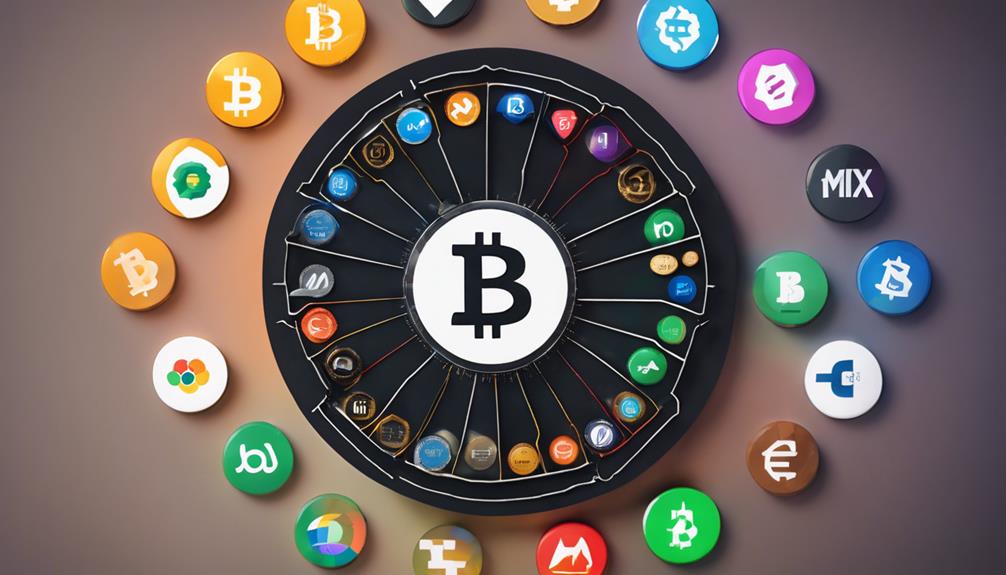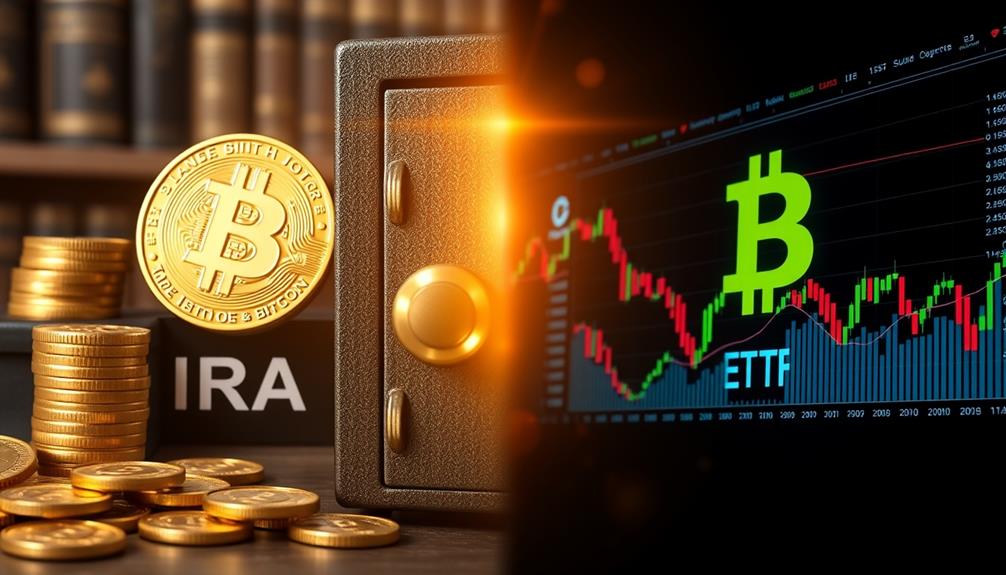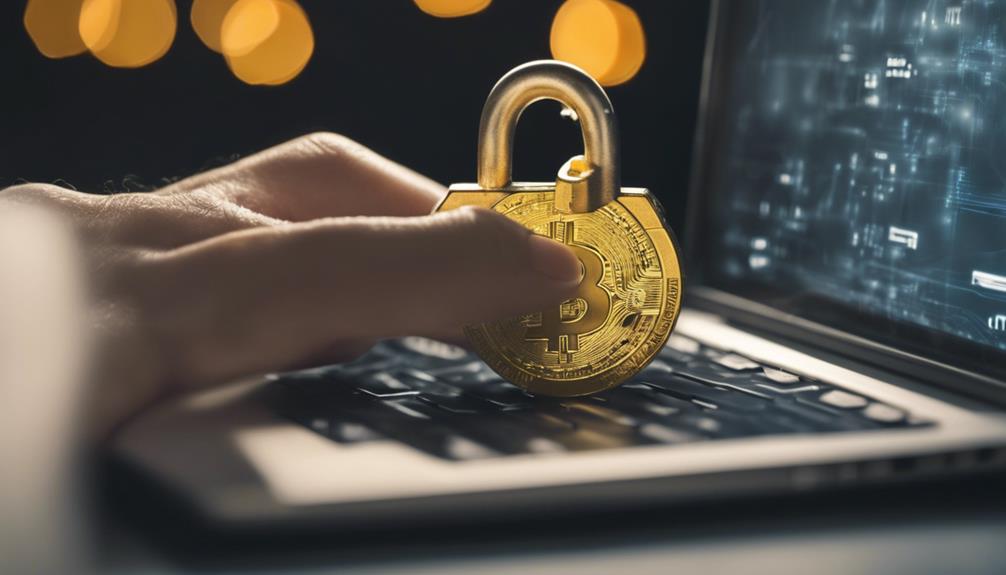When establishing limits for investing in cryptocurrency, it is important to consider balancing potential profits with your risk tolerance. Before investing, assess your financial objectives and your comfort level with risk. It is advisable to allocate no more than 5% of your portfolio to cryptocurrencies to minimize potential losses. Creating emergency savings and utilizing dollar-cost averaging can contribute to maintaining stability. Regularly monitoring and aligning with your risk tolerance is essential. Diversifying across assets helps in effectively managing risk. Keep in mind that setting clear investment limits safeguards your financial future during market fluctuations. Delve deeper to improve your comprehension.
Key Takeaways
- Allocate a maximum of 5% of your portfolio to cryptocurrencies.
- Establish investment limits based on risk tolerance and financial goals.
- Monitor progress regularly to ensure alignment with set limits.
- Implement dollar-cost averaging to mitigate market volatility effects.
- Prioritize emergency savings before allocating significant amounts to crypto.
Risk Tolerance and Financial Goals

Evaluating your risk tolerance and financial goals is essential for determining how much you can comfortably invest in cryptocurrencies. Your risk tolerance is important as it assesses the level of market fluctuations you can endure. By understanding this, you can allocate your capital wisely, especially in high-risk assets like cryptocurrency.
Your financial goals play a significant role in this decision-making process. They guide you in aligning your investments with what you aim to achieve financially. When considering crypto investments, it's important to balance the potential rewards with your risk tolerance and financial objectives. This balance ensures that you don't overexpose yourself to the volatile nature of the crypto market.
Setting Clear Investment Limits

Setting clear investment limits is essential for managing risk in the crypto market. By establishing guidelines like capping crypto investments at 5% of your portfolio, you can safeguard against excessive losses.
Monitoring your progress and aligning investments with your risk tolerance aids in making well-informed decisions.
Risk Assessment Strategies
To establish clear investment limits, assess your risk tolerance and financial goals when delving into crypto investments. Determine how much you're willing to risk based on your comfort level with market fluctuations. Set boundaries by allocating no more than 5% of your portfolio to cryptocurrencies to manage risk effectively.
Prioritize building emergency savings before venturing into crypto to safeguard your financial stability. Implement dollar-cost averaging to spread out your investments over time, reducing the impact of market volatility on your portfolio.
Stay disciplined and avoid making emotional decisions that could lead to impulsive actions. By following these strategies and remaining focused on your financial goals, you can navigate the crypto investment landscape with more confidence and control.
Monitoring Investment Progress
Evaluating your investment progress is vital to maintaining clear limits and managing your crypto holdings effectively. To guarantee you stay on track with your financial goals and risk tolerance, consider the following:
- Regular Monitoring: Keep a close eye on your investments and make adjustments as needed to stay within your set investment limits.
- Utilize Tools: Use portfolio trackers and seek guidance from financial advisors to help you assess and manage your portfolio effectively.
- Adopt Discipline: Establish a disciplined approach to adhere to your investment limits, especially during changing market conditions, to maintain a balanced portfolio.
Portfolio Diversification for Risk Mitigation

When it comes to managing risk in your investments, diversification is key. By spreading your investments across different assets, you can help mitigate potential losses.
This strategy allows you to navigate market volatility more effectively and maintain a balanced portfolio.
Risk and Diversification
Achieving effective risk mitigation through portfolio diversification involves spreading your investments across different assets to reduce potential losses. To better understand the importance of diversification and its impact, consider the following:
- Diversifying across various asset classes such as cryptocurrencies, stocks, and bonds can help reduce risk by not putting all your eggs in one basket.
- By spreading investments, you can mitigate the impact of a single asset's poor performance on your overall portfolio, leading to a more stable return over time.
- Proper diversification requires analyzing the correlation between assets to make sure that they don't move in the same direction, thereby minimizing the potential negative impact on the portfolio.
Asset Allocation Strategies
To effectively manage risk and maximize returns, consider implementing asset allocation strategies through portfolio diversification. Diversifying your investments across various crypto assets can help spread risk and reduce exposure to individual asset volatility. By allocating funds into cryptocurrencies with different market dynamics, you can balance risk and return while enhancing long-term gains. Portfolio diversification allows you to capitalize on the growth potential of different crypto assets and minimize the impact of price fluctuations on your overall portfolio performance. To create an effective asset allocation strategy, assess your risk tolerance, investment goals, and current market conditions. Utilizing a mix of crypto assets can optimize returns and mitigate risks in your investment journey.
| Benefits of Asset Allocation Strategies | Examples |
|---|---|
| Risk Mitigation | Diversifying across Bitcoin, Ethereum, and Litecoin |
| Enhanced Long-Term Gains | Investing in a mix of stablecoins, growth-oriented cryptos, and established tokens |
| Peak Portfolio Performance | Allocating funds based on risk tolerance and market dynamics |
Market Volatility Management
Mitigating market volatility through portfolio diversification is essential for managing risk in your crypto investments. When considering how to safeguard your portfolio, keep these key points in mind:
- Diversification Benefits: Spreading investments across different crypto assets can reduce the impact of market volatility on your overall investment performance.
- Balancing Risks and Gains: Allocating funds to a variety of cryptocurrencies helps balance potential losses and gains, enhancing your risk mitigation strategy.
- Sector Growth Opportunities: By diversifying, you can potentially benefit from the growth of different segments within the crypto market, further strengthening your investment portfolio against volatility.
Balancing Rewards and Risks

When determining crypto investment limits, finding a balance between potential rewards and risks is vital. To strike this balance, consider factors such as financial goals, risk tolerance, and personal financial circumstances. Assess the potential gains against the possible losses to set limits that align with your investment objectives.
Diversification across various cryptocurrencies and asset classes can help spread risks and optimize returns. Monitoring market conditions and regularly reassessing your investment limits are essential to adapt to changing financial landscapes. By maintaining a diversified portfolio and adjusting your limits accordingly, you can manage risks while aiming to maximize rewards.
Remember that setting boundaries on crypto investments not only helps in risk management but also prevents overexposure to market volatility. Balancing rewards and risks is a continuous process that requires thoughtful consideration of your financial situation and investment goals.
Avoiding Overexposure to Crypto

Avoiding overexposure to crypto is essential for maintaining a balanced and diversified investment portfolio. To prevent potential financial harm and mitigate investment risk, consider the following:
- Limit Crypto Exposure: Experts suggest allocating only a small percentage, like 5%, of your overall portfolio to cryptocurrencies like Bitcoin. This helps you avoid overexposure to the volatility of the crypto market.
- Diversify Across Assets: Diversification is key to reducing risk. Spread your investments across various asset classes, including stocks, bonds, real estate, and crypto. This approach helps cushion your portfolio against extreme fluctuations in any single investment.
- Balance for Stability: Higher allocations to crypto beyond the recommended percentage can increase the volatility of your portfolio. By maintaining a balanced approach and not overextending into cryptocurrencies, you can better protect your investments from significant swings in value.
Impact of Price Volatility

Experiencing the impact of price volatility is a vital aspect of investing in cryptocurrencies. The cryptocurrency market is known for its high volatility, which can lead to significant price fluctuations within short periods. These price swings can result in substantial gains or losses for investors.
When making investment decisions in cryptocurrencies, it's essential to take into account the potential impact of high volatility on your portfolio. Factors such as market sentiment, regulatory news, and technological developments can all contribute to price fluctuations in the cryptocurrency market.
Managing price volatility plays a key role in determining appropriate investment limits to make sure that you're comfortable with the level of risk involved. By staying informed and monitoring market trends, you can make more informed decisions regarding your cryptocurrency investments and adjust your strategy accordingly to navigate the challenges posed by price volatility.
Importance of Informed Decision-Making

To make sound decisions regarding your crypto investments, being well-informed is paramount. When determining your crypto investment limits, consider the following:
- Understanding Risk Tolerance: Evaluate how much risk you're comfortable with and adjust your investment limits accordingly. Investopedia suggests aligning your risk tolerance with your investment choices to achieve a balance that suits your comfort level.
- Setting Financial Goals: Clearly define your financial objectives before allocating funds to cryptocurrencies. Your goals will influence the amount you're willing to invest and the time horizon you're comfortable with.
- Monitoring Market Conditions: Stay informed about market trends and fluctuations to make informed decisions on your crypto investment limits. Being aware of the market environment can help you adjust your portfolio allocation strategies to mitigate risks and maximize returns.
Frequently Asked Questions
How Much Is Too Much to Invest in Crypto?
Investing in crypto can be risky. It's important to evaluate your overall financial strategy when deciding how much to allocate. Assess your risk tolerance and beliefs about cryptocurrencies.
Experts typically recommend keeping crypto investments between 5-20% of your portfolio, but it ultimately depends on your comfort level. Diversification is key to managing risk. Be thoughtful and strategic in determining the right amount to invest in crypto for your financial goals.
Is There a Limit to How Much You Can Invest in Crypto?
There's no specific limit to how much you can invest in crypto. However, it's generally recommended to allocate no more than 5% of your total investment portfolio to cryptocurrencies.
Some experts may suggest higher allocations, up to 20%, depending on your risk tolerance and belief in the potential of digital assets. Consider your overall financial goals and risk appetite when determining how much to invest in crypto assets.
How Much Leverage Is Too Much Crypto?
When considering how much leverage is too much in crypto trading, it's important to tread cautiously. Excessive leverage can magnify both gains and losses, posing significant risks.
To avoid swift liquidation during volatile market swings, it's wise to set conservative leverage levels. Understanding the potential downsides of high leverage ratios, like margin calls and forced liquidations, is essential.
How Much of My Investments Should Be in Crypto?
When considering how much of your investments should be in crypto, it's essential to align your allocation with your risk tolerance and beliefs about cryptocurrencies.
Experts generally recommend limiting crypto exposure to 5% of your portfolio, but some may go up to 20% based on individual circumstances. Larger allocations to Bitcoin can offer higher returns but also bring more volatility.
A small crypto allocation can be beneficial if prices rise without significant financial risk.
Conclusion
In determining crypto investment limits, remember to balance risks and rewards, diversify your portfolio, and stay informed.
Avoid overexposure to crypto and be mindful of price volatility.
Make informed decisions to achieve your financial goals.
Stay steady, stay smart, and secure your future with strategic crypto investments.
Helen brings a wealth of experience in investment strategy and a deep passion for helping individuals achieve their retirement goals. With a keen understanding of market dynamics, Helen has been instrumental in shaping the vision and direction of Gold IRA Markets. She specializes in creating innovative solutions that align with our clients’ long-term investment objectives.










